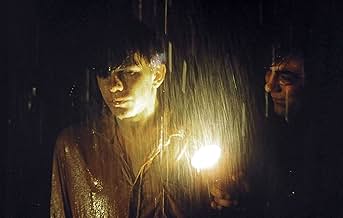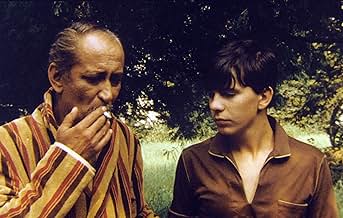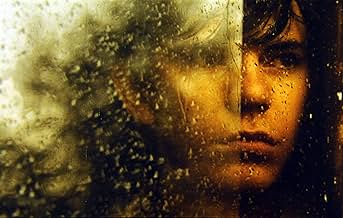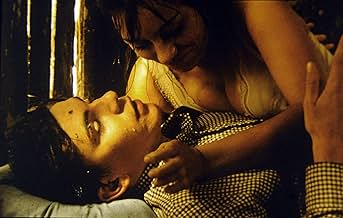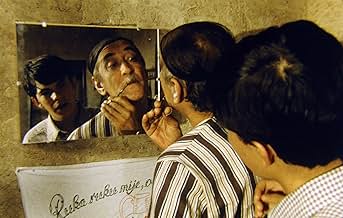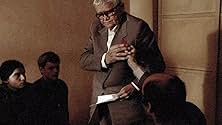CALIFICACIÓN DE IMDb
7.5/10
7.1 k
TU CALIFICACIÓN
La vida de una familia en los suburbios de Sarajevo y, en particular, de uno de sus hijos.La vida de una familia en los suburbios de Sarajevo y, en particular, de uno de sus hijos.La vida de una familia en los suburbios de Sarajevo y, en particular, de uno de sus hijos.
- Dirección
- Guionistas
- Elenco
- Premios
- 9 premios ganados y 1 nominación en total
Pavle Vuisic
- Tetak
- (as Pavle Vujisic)
Zivko 'Zika' Ristic
- Cica
- (as Zika Ristic)
- Dirección
- Guionistas
- Todo el elenco y el equipo
- Producción, taquilla y más en IMDbPro
Opiniones destacadas
whichever corner of the balkans is called home, it is all but unuarguable that Kusturica is the region's greatest filmmaker. i have enjoyed all of his films - most especially "Otac na sluzbenom putu" and "Underground" - but none disturbed me quite like this one disturbed me.
the reason is that he portrays a (former) Yugoslavia i do not know, and have never known. both my parents fled the "acceptable face of communism" during the very years this film shows almost nostalgically. they were roughly the same age as the main character, yet their experience of Tito's paradise was completely and utterly apposite to what Kusturica shows on the screen. the world they knew was one of deprivation and disappearances and harassment and they could not get away from it fast enough.
i am not saying either viewpoint is right or wrong. i just find it eye-openingly disturbing that the same place at the same time can be remembered in such radically different ways.
i believe there is a lesson in that for all of us, especially those of us whose roots lie in the balkans.
the reason is that he portrays a (former) Yugoslavia i do not know, and have never known. both my parents fled the "acceptable face of communism" during the very years this film shows almost nostalgically. they were roughly the same age as the main character, yet their experience of Tito's paradise was completely and utterly apposite to what Kusturica shows on the screen. the world they knew was one of deprivation and disappearances and harassment and they could not get away from it fast enough.
i am not saying either viewpoint is right or wrong. i just find it eye-openingly disturbing that the same place at the same time can be remembered in such radically different ways.
i believe there is a lesson in that for all of us, especially those of us whose roots lie in the balkans.
Quite simply, this is - together with "When Father Was Away on Business" - Kusturica's best film. Stylistically, the film is quite different from Kusturica's later efforts, starting with "Time of the Gypsies", but this film needs no flashy style to impress you; it is the way Kusturica tells the story and the nature of characters that draws you in instantaneously. A lot of it has to do with the screenwriter Abdulah Sidran who also worked with Kusturica on the follow-up "When Father..." (which, incidentally, deals with the same family), and who more than successfully translated his, Kusturica's and, in a way, Sarajevo's collective past onto a page (Sidran has a book by the same title) and the basis for the film. In many respect, this is the film that introduced Sarajevo and its cultural idiosyncrasies to the rest of then-Yugoslavia and put it on the country's cultural map. As strange as it may sound, before "Dolly Bell" Sarajevo was, culturally and - to some extent - otherwise, the big unknown to the rest of Yugoslavia - 'tamni vilajet', as it was referred to. The film, however, changed all of that. Whatever you may think of Kusturica and his later films, you cannot deny the superbness and extraordinary importance of his early works. See them and enjoy.
Kusturica is something of a challenge for me to parse. The experience is a bit troubling because it seems so genuine that we should be ashamed for intruding. He does not seem to accomplish this by ordinary means. Yes, the acting is good, but what works here is something quite a bit deeper than usual.
Instead of the world of the film coming to us, as is usually the case, he inserts the camera in such a way that we – or rather our intent to see – brings it into being. This is an early film, and already he seems to have mastered the art of composition. This has a couple of his trademarked panning sequences that are the most elaborately choreographed I know. But more than that, each scene progresses through what seems to be an ordered diorama of gypsy projection. It is intensely human. I can imagine the filmmaker crying as he blocks the shot and places the actors, lights, camera.
I can imagine him obsessing over how objects and shadows form families that work the way the central family does here. I can see his passion in how he guides the camera in arcs that are unnatural. It is a wonder he continued to make films, such is the obvious cost.
A lost nation. A lost larger family. A lost love. Do we remember? Can you?
Because I encounter young filmmakers, and see their first works, I know it is possible to spring whole into the art, allowing open completion of soul to make up for insufficient craft. As time went on, Emir learned to layer humor and circumstance, to tell a story. But nothing he will do can match this, his first love.
Ted's Evaluation -- 3 of 3: Worth watching.
Instead of the world of the film coming to us, as is usually the case, he inserts the camera in such a way that we – or rather our intent to see – brings it into being. This is an early film, and already he seems to have mastered the art of composition. This has a couple of his trademarked panning sequences that are the most elaborately choreographed I know. But more than that, each scene progresses through what seems to be an ordered diorama of gypsy projection. It is intensely human. I can imagine the filmmaker crying as he blocks the shot and places the actors, lights, camera.
I can imagine him obsessing over how objects and shadows form families that work the way the central family does here. I can see his passion in how he guides the camera in arcs that are unnatural. It is a wonder he continued to make films, such is the obvious cost.
A lost nation. A lost larger family. A lost love. Do we remember? Can you?
Because I encounter young filmmakers, and see their first works, I know it is possible to spring whole into the art, allowing open completion of soul to make up for insufficient craft. As time went on, Emir learned to layer humor and circumstance, to tell a story. But nothing he will do can match this, his first love.
Ted's Evaluation -- 3 of 3: Worth watching.
10doa2001
Excellent. One word to describe the hour and a half of a master-piece.I'm not so sure that non-ex-yugoslav audience would use word master-piece but I think we would all agree that we are talking about excellent , marvelous , memorable (and etc) movie.Well , to be honest , I never expected less from Emir Kusturica as a director teamed with Abdulah Sidran (who is a poet) as a screenplay writer , who gave the movie intelligent and funny dialogues (really a lot of quotes to remember) combined with deep and memorable talking about communism brought to the audience trough the words of main character Dino's father (whose occupation is head waiter in the restaurant). But , before everything `Do you remember , Dolly Bell' is a movie who drags you to the past , to the 60s in the Sarajevo , Yugoslavia , making you wish that you were there then , just to feel the life of the previous generations in the communist system in the time of yugoslav `brotherhood and unity'. Except that it is also the movie about life in the tough neighbourhood full of scoundrels of any kind. After all, Dolly Bell is a victim of the one of them , and Dino tryes to rescue her in the name of love what gives the movie romantic note.One more good thing in the movie is guaranteed the music.It's simply marvelously selected so it really gives the right image of the 60s in Sarajevo (of course you ought to know that in the 70s Sarajevo became capital of ex-yugoslav rock n' roll , so in some way movie represents roots of rock n' roll in Yugoslavia). So , what more to say than watch the movie and you'll remember Dolly Bell for the rest of your life.
I've seen this piece very shortly after I've seen Underground(which is my personal no.1). I was prepared for another energy daredevil movie trip into metaphor and symbolism - I was surprised and pleased ... Kusturica has shown ability to produce two absolutely different movies - both superb!
Do you remember Dolly Bell? is funny, sad, romantic, mystic ... and it is real, it is not a movie to go for if you are not in a mood to think and think a lot ... it is a movie about communism and its philosophy as understood by each generation - I've lived those times and I accept: this is not the typical life we lived, but it defines the essence of how we felt and what we did...
Do you remember Dolly Bell? is funny, sad, romantic, mystic ... and it is real, it is not a movie to go for if you are not in a mood to think and think a lot ... it is a movie about communism and its philosophy as understood by each generation - I've lived those times and I accept: this is not the typical life we lived, but it defines the essence of how we felt and what we did...
¿Sabías que…?
- TriviaWinner Best Actor (Slavko Stimac) at 25th Panama International Film Festival.
- ConexionesFeatured in Maradona by Kusturica (2008)
- Bandas sonoras24 mila baci
Written by Adriano Celentano, Lucio Fulci, Piero Vivarelli
Performed by Adriano Celentano
[Sung along to by Slavko Stimac]
Selecciones populares
Inicia sesión para calificar y agrega a la lista de videos para obtener recomendaciones personalizadas
- How long is Do You Remember Dolly Bell??Con tecnología de Alexa
Detalles
Contribuir a esta página
Sugiere una edición o agrega el contenido que falta


